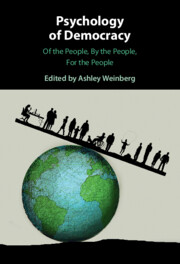Book contents
- Psychology of Democracy
- Psychology of Democracy
- Copyright page
- Contents
- Figures
- Tables
- Contributors
- Preface
- Acknowledgements
- Chapter 1 Psychology of Democracy
- Part I Of the People
- Chapter 2 Personality, Politics and Strong Democracy
- Chapter 3 From Big Ben to the Breakfast Table
- Chapter 4 Under the Microscope:
- Chapter 5 Cognitive Complexity:
- Chapter 6 In ‘A League of Their Own?’
- Chapter 7 The Mental Well-Being of Politicians
- Part II By the People
- Part III For the People
- Index
- References
Chapter 7 - The Mental Well-Being of Politicians
from Part I - Of the People
Published online by Cambridge University Press: 24 February 2022
- Psychology of Democracy
- Psychology of Democracy
- Copyright page
- Contents
- Figures
- Tables
- Contributors
- Preface
- Acknowledgements
- Chapter 1 Psychology of Democracy
- Part I Of the People
- Chapter 2 Personality, Politics and Strong Democracy
- Chapter 3 From Big Ben to the Breakfast Table
- Chapter 4 Under the Microscope:
- Chapter 5 Cognitive Complexity:
- Chapter 6 In ‘A League of Their Own?’
- Chapter 7 The Mental Well-Being of Politicians
- Part II By the People
- Part III For the People
- Index
- References
Summary
The mental well-being of politicians is not a fashionable issue. However, the effective functioning and delivery of representative democracy rests heavily on the capacity for those elected to perform their job role and to do so effectively. Despite this, wider recognition of the importance of politicians’ mental health and systems that can support it tends to be missing from public and political discourse. Progress in tackling long-standing stigma surrounding the psychological well-being of politicians has been gradual, owing to a range of societal, personal and political perceptions, yet, as an occupational group, they tend to be little or no different from the wider working population in terms of experience of depression, anxiety and related challenges to their mental health. Reviewing research on this topic, and drawing on new insights from experiences shared by parliamentarians across three continents – including from the UK, Malawi and Australia – this chapter considers a framework of nine sources of pressure facing democratically elected national politicians, reflecting the macro-, meso- and micro-level considerations of the book. These stressors emanate from societal expectations and distrust, harsh realities of political institutions and their processes, as well as the crucial, yet under-considered, influences of job design that risk failing to support the effective functioning of those we elect. Without addressing these, politicians’ well-being is a topic of concern for electors and elected alike.
- Type
- Chapter
- Information
- Psychology of DemocracyOf the People, By the People, For the People, pp. 146 - 170Publisher: Cambridge University PressPrint publication year: 2022



